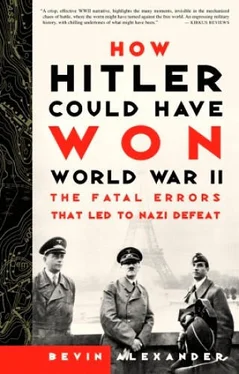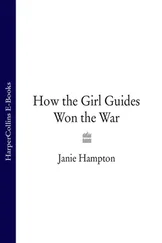However, at 8 A.M. Norrie saw German panzers approaching Sidi Rezegh from the south and east. Instead of turning his whole armored force to meet this threat, Norrie left the 6th Royal Tanks to continue the attack toward Tobruk, and diverted his other two regiments, the 7th Hussars and the 2nd Royal Tanks, to challenge Cruewell. The result was disaster. The 6th Royal Tanks charged 90th Light’s well dug-in guns and were shattered, while Rommel himself directed 88-millimeter fire on a tank sortie that tried to break out of Tobruk, knocked out several “I” tanks, and halted the advance.
Meanwhile, to the southeast of Sidi Rezegh, 15th Panzer Division drove a wedge several miles wide between the 7th Hussars and the 2nd Royal Tanks. This allowed 21st Panzer Division to overrun and almost wipe out the now-isolated 7th Hussars. After refueling, Africa Corps came back in the afternoon and attacked 2nd Royal Tanks, advancing antitank guns ahead of the tanks and around the flanks of the British armor. The AT guns took such a toll that the regiment was saved from annihilation only by the belated arrival of 22nd Armored Brigade from Gabr Saleh. The 4th Brigade didn’t come up until the next day.
Artillery of Support Group stopped an attempt by Africa Corps to overrun Sidi Rezegh airfield, but the panzer corps was now in what Napoleon called “the central position” between two enemy forces, each inferior to the central force. That is, Africa Corps was between Support Group and remains of 7th Tank Brigade on one side, and 22nd and 4th Armored Brigades approaching from the south on the other. Rommel saw that Africa Corps could destroy each in turn, and ordered Cruewell to carry out the assaults the next day.
But Cruewell had not recognized the incredibly favorable position Africa Corps had gained. Instead, he once more made a foolish error. He had planned to take Africa Corps eastward during the night, in order to achieve “complete freedom of maneuver.” Getting Rommel’s order, he made a third mistake. Instead of turning the whole corps back to the central position, he sent 15th Panzer toward Gambut, twenty miles northeast of Sidi Rezegh, and directed 21st Panzer to reassemble between Belhamed and Zaafran, some seven miles north of the airfield.
Cruewell thus separated the two panzer divisions by eighteen miles, abandoned the central position, and permitted 30th Corps to concentrate its remaining 180 tanks.
Rommel arrived around midday November 22 at 21st Panzer and discovered that his armor had been split. He determined nevertheless to oust Support Group from the airfield. While 21st Panzer’s infantry and artillery attacked Sidi Rezegh from the north, locking Support Group in place, he wheeled the panzer regiment, along with a number of 88s and 50-millimeter AT guns, to the southwest, struck the western flank of the British position, overran the airfield, and shattered part of Support Group.
Once more the British did not use their tanks in mass: 22nd Armored Brigade came up to help, but 4th Brigade inexplicably held back. German 88s and AT guns destroyed half of the 22nd’s tanks before the brigade withdrew. When 4th Brigade at last came into the fight at dusk, it was unable to retrieve the situation.
The British now decided that the airfield was untenable and withdrew south to await 1st South African Division, which had been ordered northward, although only its 5th Brigade was coming up by the morning of November 23.
Meanwhile, Cruewell returned with the 15th Panzer and struck the 4th Armored Brigade from the east after it had drawn into a defensive “hedgehog” perimeter. The Germans seized the brigade headquarters and a large number of men and tanks, mutilating the brigade to such a degree that it was unable to reassemble the next day.
Africa Corps had gained command of the battlefield. The 15th Panzer was at Bir Sciaf Sciuf, fifteen miles east of Sidi Rezegh; 21st Panzer was holding the Sidi Rezegh area; and the Italian Ariete and Trieste Divisions were assembling around Bir el Gubi, twenty-two miles to the south.
Rommel had received reports that 7th Armored Division’s remnants had withdrawn from the airfield, and assumed that the division had moved about twelve miles south of Sidi Rezegh. He saw that 7th Armored and 5th South African Brigade might be destroyed on November 23 by a concentric attack, with the Italians moving northeast, and Africa Corps enveloping them by driving south and west.
However, Cruewell had put in motion his own plan by the time Rommel’s order arrived, thereby showing that even the best concepts of a commander can be upset by a subordinate who does not comprehend what the commander is doing.
Meanwhile, 2nd New Zealand Division of 13th Corps had advanced directly from the east, seized Fort Capuzzo, and sent its 6th Brigade westward along an Arab desert trail, the Trigh Capuzzo. Soon after daylight on November 23, after Cruewell had departed, the brigade bumped into Africa Corps headquarters at Gasr el Arid, twenty-five miles east of Sidi Rezegh, and seized it after a bitter fight. Loss of the corps staff and its radio links seriously handicapped Rommel in the days to follow.
Cruewell’s plan to destroy 7th Armored Division and 5th South African was foolish. He ordered 21st Panzer’s infantry and artillery to hold the escarpment and airfield south of Sidi Rezegh, while the division’s panzer regiment joined 15th Panzer for a wide sweep around the rear of 7th Armored Division and the South African brigade, and join up with the Ariete and Trieste Divisions moving up from Bir el Gubi. Cruewell’s idea was not a concentric assault on the enemy from all sides, as Rommel intended, but an assault by all the assembled Axis strength head-on against the British and South Africans.
However, when Cruewell’s forces rumbled southwestward through early morning mist on November 23, they ran smack into the center of 7th Armored’s position.
General Norrie had not moved the division twelve miles south to link up with the South Africans, as Rommel thought, but a few miles southeast. The British were as surprised as the Germans, and the arrival of the panzers set off a wild stampede in all directions by British tanks and other vehicles trying to get away. The scattering of the division offered Cruewell a golden opportunity to destroy the whole force in detail. But Cruewell, intent on linking up with the Italians, called off pursuit, and, swinging on an even wider outflanking movement, continued to the southwest. Thus Cruewell missed one of the great chances in the war.
Cruewell didn’t reach the Italians until midafternoon. And it took a while to line up his forces for attack on the South Africans, now to the north. In the long delay Cruewell had given them, the South Africans moved most of their guns to the exposed flank and formed a powerful defensive barrier.
Cruewell now committed one further error. Instead of following German tactical doctrine and advancing antitank guns forward and around the flanks to engage enemy armor and neutralize enemy artillery and tanks before committing his panzers, Cruewell formed up his tanks in long lines, and, ordering his infantry to follow in trucks, launched a headlong charge. They met a curtain of fire. Tank after tank was shattered, truck after truck full of infantry destroyed. The Germans had to commit all of their artillery to silence the South African guns, while British and German tanks and antitank guns fought tremendous duels. By late afternoon the panzers finally punched a few holes in the front and the tank attack moved forward, destroyed the 5th South African Brigade, and killed or captured 3,000 soldiers. As darkness fell, hundreds of burning vehicles, tanks, and guns lit up the horizon.
Cruewell’s attack had succeeded, but at enormous cost. Hundreds of German infantry had been killed, and Africa Corps lost seventy of its remaining 160 tanks. Although 30th Corps had only seventy tanks fit for action, and these widely dispersed, out of 500 at the start, the British had large tank reserves, the Germans almost none.
Читать дальше


![Джонатан Димблби - Barbarossa - How Hitler Lost the War [calibre]](/books/385421/dzhonatan-dimblbi-barbarossa-how-hitler-lost-the-w-thumb.webp)









